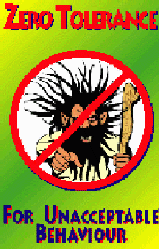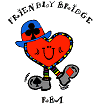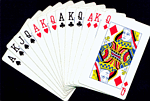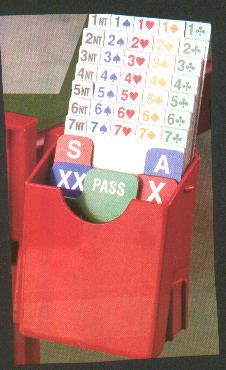|
| last updated 5-Sept 2010 | |
|
 |
||||
| The club operates a (close to) Zero Tolerance policy. Refer to the link on the right for a definition of Zero Tolerance. | |||||
|
|||||
 |
|||||
|
|||||
If you wish you can view download the Word Doc file for printing.
Dress Code Respectable shorts and a shirt are the accepted minimum. T-shirts with sleeves will be allowed but vest type T-shirts are unacceptable.
Manners: Be friendly and courteous at all times. NEVER CRITICISE OR OFFER ADVICE UNLESS ASKED. |
 |
Laws The generally accepted laws of bridge apply, but as this is a small friendly club there are a few local rules: -
1- Psyches Outright psyches are not allowed. This is because of the many beginners and inexperienced players who cannot handle them.
Pre-empts must conform with the ‘Australian’ rule of 15. Add up the points together with the lengths of the two longest suits. If the addition is 15 or more then you may pre-empt (14 is allowed here for pre-empts below 2NT).
2- Revokes At our club we like to solve the problems occurring after a revoke as easily as possible. If anyone at the table (including dummy) suspects that anybody else at the table has revoked then they should ask them immediately so that the possible revoke can be solved easily and quickly. In particular I note that Law 61B states that one defender may not ask his partner if he has revoked. This is nonsense in my view and most certainly will not be applied in this club. It's up to you what you do when the opposition revoke and it not immediately spotted. The rules say to call the director and this is what you should do if play has continued for a while. However, I don't bother if the revoke is easily rectified next trick. Up to you. Is winning that important? Not everybody in this club is an expert, please be considerate towards less gifted players |
|
||
|
3- Count your cards The rules clearly state that a player should count his cards – without looking at them – before doing anything else. If a hand is into the playing stage before somebody discovers that they have the incorrect number of cards then the hand has to be scrapped for that table (and I have to sort out the mess). So the guilty partie(s) will be given a zero score and the non-offending parties will receive an adjusted (favourable) score. |
|
|
5- System All systems are allowed but the majority play Standard American. If you play another system then it is polite to inform the opposition when you first meet. We have blank convention cards if you wish to fill one out.
6- Alerts The laws keep changing are virtually incomprehensible. At our club I try to keep it simple, alert bids that are not ‘standard'. It is polite to inform opponents before play if you play anything other than Standard American (i.e. weak NT or 4 card majors). The range of your NT bid should be announced.
| Alertable | Not Alertable | |
| Puppet Stayman and replies | Normal Stayman. | |
| A 2NT bid having bid Stayman if it does not guarantee a 4 card major. | ||
| Transfers to minor(s) | Jacoby transfers to a major (announce) | |
| Natural 2♦/♥/♠ response to a 1NT opening (announce) | ||
| A 1♣ opening if it may be 2 card (anounce) | Possible 3 card 1♣/♦ openings | |
| Whether you play 4 or 5 card majors | ||
| 4♣ (Gerber) if bid in a suit sequence | 4♣ (Gerber) after a NT bid | |
| Any type of Blackwood | ||
| Responses to Blackwood/Gerber | ||
| Most bids at the 4 level or above | ||
| Strong Opening 2♦/♥/♠ | Weak 2's | |
| Bids that are not natural, such as: | Cue bid of opponent's suit | |
| splinters | ||
| Trial Bids (short suit) | Help suit game tries (3+ cards) | |
| 4 th suit forcing | ||
| Multi 2♦ and subsequent conventional bids... | ||
| .... including a pass of 2♥ showing weak ♥ 's | ||
| Jacoby 2NT and subsequent replies | 2NT by responder if it is 11-12 balanced | |
| a 1NT rebid of 15-16 playing a weak NT | ||
| A forcing NT (i.e. playing 2/1) | ||
| 2♣ opening if other than 22/3+ or game forcing | 2♣ opening if standard (22/3+ or g.f.) | |
| the 2♥ response if negative | the 2♦ response if negative or waiting | |
| the 2NT response if showing ♥'s | ||
| low level direct penalty doubles | Negative (sputnik) doubles | |
| Support dobubles | ||
| Strong/Intermediate jump overcalls | Weak jump overcalls | |
| Weak jump shifts | Strong jump shifts | |
| Take-out doubles to shoe points | 'standard' take-out doubles | |
| Any bid which you think opponents need to know | A bid which partner may have forgotten |
7- Announcements I covered alerts, but best is to simply announce ‘12-14' or ‘15-17' or whatever when partner opens 1NT. Similarly you can simply state ‘transfer' if partner makes a transfer bid over your 1NT opening or overcall and announce ‘natural' if a 1♦/♥ bid over your 1NT is natural. And if a 1♣ opening can be 2 card you should announce ‘may be short'
8- Alerting/Anouncing Natural Bids? There have been a few mis-understanding at the club in the past and so I'll take this opportunity to clear up a few things. Now I do not agree with everything that the ACBL says, but the following extract from their paper on alerts certainly makes a lot of sense. ‘Natural bids that convey an unexpected meaning must be Alerted . This includes strong bids that sound weak, weak bids that sound strong, and all other bids that, by agreement, convey meanings different from, or in addition to, the expected meaning ascribed to them'. So then, natural bids that have an unexpected meaning should be alerted/announced, and I totally agree. It's a shame that the WBF do not always implement the above paragraph. Let's have a few important examples of my interpretation of this and how it applies at our club: -
• Transfers . If you play 2♦/♥ as natural over partner's 1NT then this is a natural bid with an unexpected meaning (most would expect a transfer these days) and I believe it fits in with their paragraph above and needs alerting. It is not in accordance with other ACBL rules (so they have got themselves in a muddle here) but at this club a natural 2♦/♥ response to 1NT should be alerted as it is unexpected. I have no problem if you also alert or announce transfers (I always announce).
• Strong opening twos . The ACBL are not specific here and so I believe that their paragraph above should apply. Most players play weak opening twos and so a strong opening two needs to be alerted at this club in accordance with the above paragraph.
• Weak jump shifts . The ACBL are actually very specific here – weak jump shifts are not standard and I totally agree that they need to be alerted.
• Weak jump overcalls . These are standard and not alertable. Only strong/intermediate jump overcalls need alerting in accordance with the ACBL's paragraph.
• The opening 1NT range . Responder should announce partner's 1NT range. However, many players forget to do this and they will not be penalised. I know that if you are a Brit it is not automatic to announce or alert a 12-14 1NT, so if in doubt about the opponent's range, then ask (or look at their convention card! Ho, ho). I generally announce my partner's 1NT opening range unless I know for certain that the opponents know what it is.
Incidentally, if your partner fails to announce or alert a bid then: -
• If you are declarer or dummy then you should inform the opponents before the opening lead and call the director if somebody feels it is really necessary.
• If you are defending you should say nothing (you may be helping partner). You can call the director at the end of play if declarer feels that he was harmed.
Let's have a few natural bids that have come up and were queried as to whether they were alertable or not (no interference): -
1NT- 2♣ - 2♦ - 2♠ : 2♠ is weak playing Garbage Stayman. This is not unexpected and thus not alertable.
1♣ - 1♠ - 1NT - 3♦ : This pair play NMF and so 3♦ is weak. Nobody was sure at the time, but I now believe that this fits in with the ACBL's paragraph and should have been alerted as one would normally expect 3♦ to be a forcing bid here.
1NT- 2♣ - 2♦ - 2NT : If the 2♣/2NT bidder is not guaranteeing a 4-card major then the ACBL say that he 2NT bid need alerting. I (reluctantly) go along with this, my personal opinion is that 2♣ should have been alerted. Most people expect a Stayman bidder to have a 4 card major and I think that 2♣ should be alerted if this is not so (say playing SARS and/or 4-way transfers). Anyway, one of the bids needs alerting.
1NT- 2♣ - 2♥ - 2NT : If the 2♣/2NT bidder is denying 4 ♠ 's (as when you play 4-way transfers) then the 2NT bid needs alerting (if you have not already alerted the 2♣ bid).
And a few ones that I clearly mentioned earlier: -
2♦/♥/♠ : If it's a strong two then it should be alerted at this club.
1NT- 2♦/♥ : If 2♦/♥ is natural then it needs alerting at this club. If it's a transfer then it's best for opener to simply announce ‘transfer'.
1♣ - 2♥ : If you play jump shifts as weak then that is alertable.
2♣ /♦ : If 2♣ is your only strong bid then it does not need an alert. If you play Benjamin twos then both 2♣ and 2♦ openings (and responses) need alerting.
2♣ - 2♦ : If 2♦ is negative or waiting it needs no alert.
1NT : The rules keep changing here. I think it's unfair to have different rules for strong or weak NT and I think that both should be announced, but I will impose no penalty if anybody forgets.
1♣ - 1♥ - 1NT : If the 1NT rebid may be stronger than 15 points the ACBL say that it needs alerting. Playing Acol 1NT here is 15-16. This is not America and it is not the UK and, as I said above, I see no reason why Acol players should be treated differently from Standard American players; I do not believe that the bid needs alerting. If you are playing against a pair of Brits then it's quite likely that they are playing a weak No Trump and so a 15-16 point range here is not unexpected.
Of course, the simplest solution to most situations is to fill out a convention card!!
9- Questions. During the auction, you may ask questions (to the partner of the opponent who made the bid) at your turn . Unless it affects your action, I generally recommend not asking questions until the end of the auction. For example, do not ask opponents what type of Blackwood they are playing or how many Aces etc have been shown, wait until after the auction unless it affects a decision that you may make. It is also unwise to ask if a natural response to a 1NT opening is forcing (unless you intend to bid) as opponents may not know. If you are defending and you are on lead, then you should ask questions before leading. When you lead, it should always be face down and you say ‘Questions partner?' or ‘OK?'. Your partner may then ask questions before the opening lead is revealed. If you are not on lead and partner has a propensity to lead face up, then ask him to lead face down, especially if you have a question.
10- Insufficient Bids We need to be less strict about the rules when a player make an insufficient bid. As an example, suppose partner opens 1♦ and you respond 1♥ but it transpires that there was an intervening 1♠ overcall that you did not notice. Then the offender should be allowed to change his bid to a negative double (which means the same as 1♥ if there was no overcall) without penalty. This is not ‘standard' rules – but simply common sense and so what applies at our club.
11- Calling for Dummy's Card If declarer has something like ♦QJ109872 and calls for a ♦ then he probably means from the top and should be allowed to say so subsequently – perhaps by any player asking ‘which one?' And suppose a player has a holding such as AQ and the lead comes up to this holding with the intention of finessing but the king appears and he inadvertently goes through with the ‘finesse' and plays the queen, then he should be allowed to replace the Q with the A.
12- Passed Out Standard rules are pretty clear here – if a deal is passed out then you write it on the traveler and move on to the next board. But our club is basically a friendly club where people want to play Bridge – and not sit out when others are playing. So if a board is passed out on the first round on a Wednesday (when the hands are shuffled) it should be re-dealt.
13- Prepared Boards On Mondays and Fridays the boards are prepared in advance. I use the Dealmaster Pro program; and I use the option that there is always at least one hand with at least 12 points – that reduces the above possibility of a pass-out. I also use the option within the Dealmaster Pro program to ensure that the points are roughly evenly distributed between N-S and E-W over the complete set of boards so that both sides have approximately equal chances of defending/declaring etc. And we obviously have the advantages of players getting a hand print-out at the end and any mis-boarding being easily dealt with.
14- Cards on the Table During the play, all players should place the cards played down in the correct orientation - longways when the trick is won and sideways when lost. At the end of the deal the number of tricks should be agreed and written on the traveler before the hands are returned to board. If there is a dispute about tricks won and the director is called then I will usually be on the side of a player who still has his cards laid out ‘correctly' in front of him.
15- Hesitation . We all sometimes need to think, and if you think for a long time and then bid then that's fine. But if you think for a long time and pass then you are passing unauthorised information to partner (that you were thinking of bidding). Partner is not banned from the auction but if he bids is must be a very clear bid. If he make a ‘dodgy' bid then the director will adjust the score accordingly.
16- The 1NT opening. If your range is, say, 15-17, then do not open out-of range. One point off (so a good 14 or a bad 18) is quite acceptable, but a greater deviation is not. And note that a 1NT opening should be balanced. 2335 type shape is fine and even 2236 is acceptable with a 6 card minor. Opening 1NT with a singleton is now allowed at the club, provided that the singleton is an ace or a king.
17- Reviewing the cards played to the last trick. The strict rules of bridge do not allow you to see the last trick once everybody has turned their card over. This can cause problems (uncertainty as to where the lead is etc.) and with the large number of inexperienced players at our friendly club we do relax this rule so that anybody may ask to see the cards for the last trick before any card is played to the next one.
18- The short ♣. There was an incident involving the short ♣ in news-sheet 257. As a result I have amended the club rules as follows: -
| a) | A 1♣ opening that may be short (maybe two cards) needs to be announced . Wave the alert card and state ‘could be short'. Better minor (so at least 3 ♣'s does not need alerting) |
| b) | At no stage during the auction may an opponent ask if you are playing a short ♣. This is unethical/cheating as it may imply that you yourself have long ♣'s. |
I think that established pairs should have a card. I always have one when I play with a fairly regular partner and I'll help you to fill out one for your partnership if you wish.
A large number of players at our club are inexperienced and the club rules, which may differ from WBF/ACBL at times, are designed with that in mind – to make it easier for them.
Zero Tolerance – this in an extract that I got off the internet and is applicable at our club: -
The purpose of the Zero Tolerance (ZT) policy is to create a much more pleasant atmosphere at all our venues. This is an attempt to eradicate unacceptable behaviour in order to make the game of bridge more enjoyable for all.
|
The following are some examples of commendable behaviour that will significantly contribute to an improved atmosphere: being a good 'host' or 'guest' at the table; greeting others in a friendly manner; praising the bidding and/or play of the opponents; and having a clearly completed convention card readily available to the opponents (required by regulation). | ||||||
|
|
||||||
| If a player at the table behaves in an unacceptable manner, the director should be called immediately. Annoying behaviour, embarrassing remarks, or any other conduct which might interfere with the enjoyment of the game is specifically prohibited by Law 74A. | |||||||
| Law 91A gives the director the authority to assess disciplinary penalties. | |||||||








